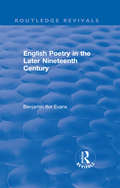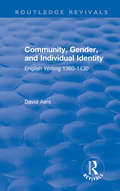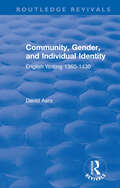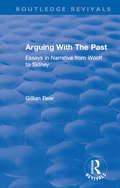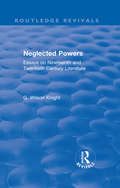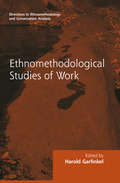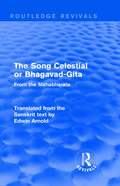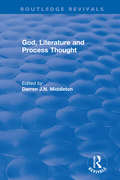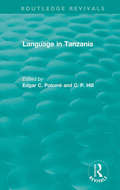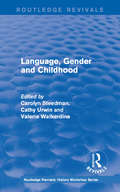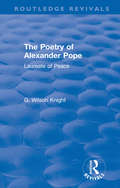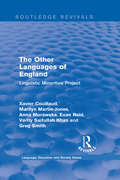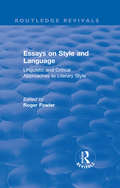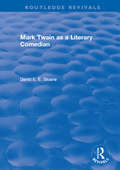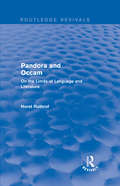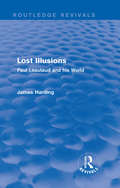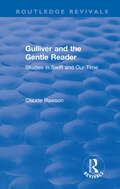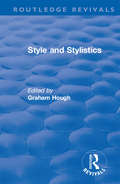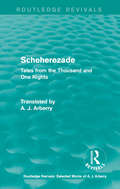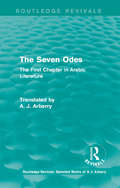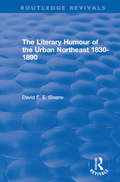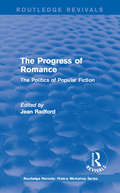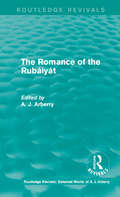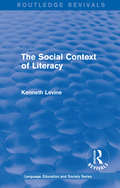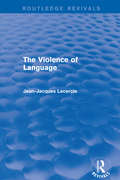- Table View
- List View
Routledge Revivals: English Poetry in the Later Nineteenth Century (Routledge Revivals)
by B. Ifor EvansFirst published in 1933, this study, which underwent revision in the 1960s, is a comprehensive survey of the verse of English nineteenth-century poets whose work appeared after 1860. A special feature is the full and critical treatment of minor writers. In no other book is their work so carefully evaluated. There is a full account of the minor Pre-Raphaelites, of James Thomson, the poet of The City of Dreadful Night, of Henley, Stevenson and George MacDonald. John Davidson is the subject of a long and revealing study. Evans suggests that poetry from the late nineteenth century is neglected in scholarly study, and that Victorian Romanticism deserves more attention than it has recently received.
Routledge Revivals: English Writing 1360-1430 (Routledge Revivals)
by David AersFirst published in 1988, David Aers explores the treatment of community, gender, and individual identity in English writing between 1360 and 1430, focusing on Margery Kempe, Langland, Chaucer, and the poet of Sir Gawain. He shows how these texts deal with questions about gender, the making of individual identity, and competing versions of community in ways which still speak powerfully in contemporary analysis of gender formation, sexuality, and love. Making wide use of recent research on the English economy and communities, and informed by current debates in the theory of culture and gender, the book will be of interest to those concerned with Medieval studies, Renaissance studies, and Women’s studies.
Routledge Revivals: English Writing 1360-1430 (Routledge Revivals)
by David AersFirst published in 1988, David Aers explores the treatment of community, gender, and individual identity in English writing between 1360 and 1430, focusing on Margery Kempe, Langland, Chaucer, and the poet of Sir Gawain. He shows how these texts deal with questions about gender, the making of individual identity, and competing versions of community in ways which still speak powerfully in contemporary analysis of gender formation, sexuality, and love. Making wide use of recent research on the English economy and communities, and informed by current debates in the theory of culture and gender, the book will be of interest to those concerned with medieval studies, Renaissance studies, and women’s studies.
Routledge Revivals: Essays in Narrative from Woolf to Sidney (Routledge Revivals)
by Gillian BeerFirst published in 1989, this book analyses fiction and long narrative, drawing on a broad range of writing from earlier periods and on recent narrative theory. Gillian Beer looks at the work of writers as diverse as Thomas Carlyle and Philip Sydney, Samuel Richardson, and George Eliot. Three chapters on Virginia Woolf demonstrate how Woolf’s reading of past literature, philosophy, and science gave her an intellectual and emotional purchase on problems of feminism and modernism. Beer examines how writers create dialogues with past writing, how readers of the present day engage with the difference of past literature, and how we make contact with the desires and debates of past readers.
Routledge Revivals: Essays on Nineteenth and Twentieth Century Literature (Routledge Revivals)
by G. Wilson KnightFirst published in 1971, Professor Knight’s book draws analytic attention to poets including Tennyson, Masefield, and Brooke, who are shown to hold a dimension of meaning previously ignored or misunderstood. Homage is paid to John Cowper Powys as one of the foremost seers of the modern age. A comprehensive review of the work of Francis Berry claims to establish him as our foremost living poet. Professor Knight urges, and goes far to prove, that modern literary criticism up until the 1970s failed to touch upon the richer meanings of contemporary literature – he stresses the relation between such acclaimed poets as Yeats and Eliot and the spiritualistic movements of contemporary times. Knight regards youth-revolts as a sign of a healthy dissatisfaction with an irreligious and directionless culture, and believes that hope lies in the neglected powers pressing for acceptance.
Routledge Revivals: Ethnomethodological Studies of Work (Directions in Ethnomethodology and Conversation Analysis)
by Harold GarfinkelFirst published in 1986, this collection of essays brings together ethnomethodological studies from key academics of the discipline, including the renowned scholar Harold Garfinkel who established and developed the field. In addition to four case studies, the volume begins and ends with two essays which discuss some of the theory employed by ethnomethodologists. The essays in this collection look at a range of areas, from truck wheel accidents and their regulation, to martial arts and alchemy and provide concise and insightful examples of the ways in which ethnomethodology can be applied to a number of settings and subjects. This work will be of interest to those studying ethnomethodology and sociology.
Routledge Revivals: From the Mahabharata (Routledge Revivals)
by Edwin ArnoldFirst published in 1909, this book presents an English translation of chapters 25-42 of the Bhishma Parva from the epic Sanskrit poem Mahabharata — better known as the Bhagavad-Gita, reckoned as one of the "Five Jewels" of Devanagari literature. The plot consists of a dialogue between Prince Arjuna and Krishna, the Supreme Deity, in a war-chariot prior to a great battle. The conversation that takes place unfolds a philosophical system which remains the prevailing Brahmanic belief, blending the doctrines of Kapila, Patanjali, and the Vedas. Building on a number of preceding translations, this highly-regarded poetic interpretation provides a major work of literature in an accessible popular form.
Routledge Revivals: God Literature And Process Thought (2002) (Routledge Revivals)
by Darren MiddletonOriginally published in 2002 God, Literature and Process Thought looks at the use of God in writing, as a part of the creative advance, immersed in the processes of reality and affected by events in the world. This edited collection outlines and promotes the novel view that there is much to be gained when those who value the insights of process thought ‘encounter’ the many and varied writers of literature and literary theory. It also celebrates the notion of process poesis, a fresh way of reflecting theologically and philosophically that takes account of literary forms and promises to transform creatively the very structure of process thought today.
Routledge Revivals: Language in Tanzania (Routledge Revivals)
by Edgar C. Polomé C. P. HillOriginally published in 1980, Language in Tanzania presents a comprehensive overview of the Survey of Language Use and Language Teaching in Eastern Africa. Using extensive research carried out by an interdisciplinary group of international and local scholars, the survey also covers Ethiopia, Kenya, Uganda and Zambia. The book represents one of the most in-depth sociolinguistic studies carried out on this region at this time. It provides basic linguistic data necessary to policy-makers, administrators, and educators, and will be of interest to those researching the formulation and execution of language policy.
Routledge Revivals: Language, Gender and Childhood (Routledge Revivals: History Workshop Series)
by Carolyn Steedman, Cathy Urwin and Valerie WalkerdineFirst published in 1985, this book brings together recent work on women and children from the nineteenth-century to the present. The contributors explore in different ways, and from different points of view, the way in which issues of language have been — and are still — central to the history of women and their relation to domestic and educational practices. A crucial issue is the contrast between what it spoken about girls and women, and what girls and women can speak about. The contributors relate this theme specifically to women’s position as mothers and the education of girls and women.
Routledge Revivals: Laureate of Peace (Routledge Revivals)
by G. Wilson KnightFirst published in 1955, this exegesis on the writings of Alexander Pope reveals the technical felicities of his poetry, and is the first to be devoted to the great meaning inherent in his work. One section, which has appeared before and did much to redirect the study of Pope, has been thoroughly revised. Of the other four chapters, one offers an original of The Temple of Fame, and, while discussing this neglected poem, makes several suggestions which may be said to constitute a significant advance in aesthetics. Another analyses Byron’s support of Pope, regarding it as a landmark in the history of English literary criticism and as necessary to the understanding of Pope and Byron alike. The last chapter discusses the relation of Pope’s thought to our own time. This book adds much to what is already known of Pope, and will go far in reviving an interest in the work and philosophy of the Laureate of Peace.
Routledge Revivals: Linguistic Minorities Project (Routledge Revivals: Language, Education and Society Series #2)
by Greg Smith Xavier Couillaud Marilyn Martin-Jones Anna Morawska Euan Reid Verity Saifullah KhanThe ‘other’ languages of England — those which originate in South and East Asia, and Southern and Eastern Europe — are now important parts of everyday life in urban England. First published in 1985, this book gives detailed information about which languages are in widespread use among children and adults, patterns of language use in different social contexts, the teaching of these community languages inside and outside of mainstream schools, and the educational implications of this linguistic diversity for all children in England. They authors argue that this continued and widespread bilingualism is a valuable potential resource for both the speakers and society as a whole.
Routledge Revivals: Linguistic and Critical Approaches to Literary Style (Routledge Revivals)
by Roger FowlerFirst published in 1966, this book is contributed to by authors who share an interest in the literary uses of language. The book gives a close analysis of the language of literature contributed to by critics and linguists, examining linguistic theory and poetry, and as part of this the rhythm and metre of English poetry is deconstructed. Language and its emotive structure is analysed, while the middle chapters of the book address the interaction of linguistic dimensions. Two medievalist scholars conclude the volume, giving a well-rounded examination to the broad and complex study of literary style in the English language. This book is suitable for students and scholars concerned with English literature and linguistics.
Routledge Revivals: Mark Twain as a Literary Comedian (Routledge Revivals)
by David E. SloaneOriginally published in 1979, Mark Twain as a Literary Comedian looks at how Mark Twain addressed social issues through humour. The Southwest provided the subject for much of Twain’s writing, but the roots of his style lay principally in north-eastern humour. In the mid-1800s the northern United States underwent social changes that reflected in the writing of the literary humourists like Twain. Sloane argues that he used humour to describe conditions in the emerging middle-class urban experience and express his American vision and that Twain’s views on the human, social, and political conditions, presented through his fictional characters, elevated the use of literary humour in the American novel.
Routledge Revivals: On the Limits of Language and Literature (Routledge Revivals)
by Horst RuthrofFirst published in 1992, this book evokes Pandora and Occam as metaphoric corner posts in an argument about language as discourse and in doing so, brings analytic philosophy to bear on issues of Continental philosophy, with attention to linguistic, semiological, and semiotic concerns. Instead of regarding meanings as guaranteed by definitions, the author argues that linguistic expressions are schemata directing us more or less loosely toward the activation of nonlinguistic sign systems. Ruthrof draws up a heuristic hierarchy of discourses, with literary expression at the top, descending through communication-reduced reference and speech acts to formal logic and digital communication at the bottom. The book offers multiple perspectives from which to review traditional theories of meaning, working from a wide variety of theorists, including Peirce, Frege, Husserl, Derrida, Lyotard, Davidson, and Searle. In Ruthrof’s analysis, Pandora and Occam illustrate the opposition between the suppressed rich materiality of culturally saturated discourse and the stark ideality of formal sign systems. This book will be of interest to those studying linguistics, literature and philosophy.
Routledge Revivals: Paul Léautaud and his World (Routledge Revivals)
by James HardingPaul Léautaud was both one of the oddest characters in French literature and, as a staff member of the review Mercure de France, at the centre of Parisian literary life for over half a century. First published in 1974, this book represents the first full length biography of Léautaud in any language. The author recreates the world of a man who, once regarded as a mere eccentric, is now recognised as a significant figure in contemporary literature. It traces Léautaud’s intimate friendships with many famous writers of the time and gives a lively panorama of the French literary scene and its vivid characters.
Routledge Revivals: Studies in Swift and Our Time (Routledge Revivals)
by C J RawsonOriginally published in 1991, Gulliver and the Gentle Reader critically examines the writing of Jonathan Swift. The book is predominately concerned with what Rawson coins ‘the "unofficial" energies’ which work below the surface of Swift’s conscious themes. Alongside this discussion, Rawson provides detailed studies on historical, cultural and psychological relationships, and the connections that exist between these areas and more extreme writers of the later period such as Breton, Mailer, and Yeats, as well as the connections with the writers such as his contemporary Pope, and those that followed such as Johnson, and Sterne. This book will be of interest to students of literature, as well as those researching in the area of literature.
Routledge Revivals: Style and Stylistics (Routledge Revivals)
by Graham HoughFirst published in 1969, Professor Hough’s work examines stylistics – the bridge between linguistics and literary criticism. The book gives a short survey of stylistics from a literary point of view, and tries to answer the question of how much stylistics contributes to the understanding of literature. It brings together continental European work on stylistics and Anglo-American critical writing which has a similar purpose though usually under a different name. In calling the attention of the student of literature to trains of thought with which he is not generally familiar, and with detailed analysis on different literary styles and methods, Professor Hough provides important critical insights.
Routledge Revivals: Tales from the Thousand and One Nights (Routledge Revivals: Selected Works of A. J. Arberry #1)
by A. J. ArberryFirst published in 1953, this translation of part of the Arabian Nights by A. J. Arberry offers four famous stories in modern idiom: Aladdin, Judar, Aboukir and Abousir, and the Amorous Goldsmith. The introduction provides a brief analysis of earlier translations of the tales and explains their value as indicators of the society in which they were written. This work will be of interest to those studying Middle-Eastern literature and history.
Routledge Revivals: The First Chapter in Arabic Literature (Routledge Revivals: Selected Works of A. J. Arberry #2)
by A. J. ArberryThese seven poems, translated by A. J. Arberry in 1957, are the most famous survivors of a vast mass of poetry produced in the Arabian Desert in the sixth century. Arberry’s introduction explains to the reader what was known about the poems and how they came to be preserved and distributed over time. The epilogue particularly interrogates the authenticity of the poems and tracks how they have been transmitted over time. This work will be of interest to those studying Persian and Middle-Eastern literature and history.
Routledge Revivals: The Literary Humour of the Urban Northeast 1830-1890 (Routledge Revivals)
by David E. SloaneThe Literary Humour of the Urban Northeast brings together works by such writers as Mark Twain, P.T. Barnum, Marietta Holley, and the literary comedians Artemus Ward and Josh Billings. The northern writers chronicled a fast-moving world, dominated by government and business. In this anthology, David Sloane recovers satiric writings of the north-eastern humourists of the nineteenth century, a literary school that was formed in the crucible of the daily newspaper. Written to appeal to a newly urbanized audience experiencing the impact of the Industrial Revolution, these humorous articles, sketches and ballads responded to a rapidly changing nation still clinging to rural preconceptions but at the same time beginning to know a sharper more precarious kind of existence.
Routledge Revivals: The Politics of Popular Fiction (Routledge Revivals: History Workshop Series)
by Jean RadfordFirst published in 1986, the aim of this book is to present some of the changing thinking on popular writing to a wider audience in view of the enormous growth of mass culture after the war, but also to offer a historical perspective on a specific form of popular fiction: the romance. The essays collected here reflect diverse positions and methods in the current debate: sociological, psychoanalytic and literary. Some focus more on texts or readers, others concentrate on theoretical questions about narrative or ideology. All of the essays, however, view popular forms and their uses historical in historical context — rejecting the notion they are a contaminated by-product of industrialism.
Routledge Revivals: The Romance of the Rubáiyát (Routledge Revivals: Selected Works of A. J. Arberry)
by A. J. ArberryFirst published in 1959, this reprint of the first edition of Edward FitzGerald’s translation of the Rubáiyát is accompanied by an introduction and notes by A J Arberry, one of Britain’s most distinguished Orientalist scholars. The Rubáiyát is a selection of poems written in Persian attributed to Omar Khayyám. The work will be of interest to those studying Middle Eastern Literature.
Routledge Revivals: The Social Context of Literacy (Routledge Revivals: Language, Education and Society Series #1)
by Kenneth LevineFirst published in 1986, this book looks at the impact of mass literacy on everyday life, discussing the fundamental differences between traditional oral cultures and contemporary industrialised societies where most people rely on complex combinations of oral and literate communication. There is also a detailed examination of the problems of the sub-literate minority with recommendations for future programmes of assistance. This book also provides a historical survey of the spread of literacy in British society from the Roman occupation onwards. In conclusion, the author discusses the impact of information technologies on people with limited basic skills.
Routledge Revivals: The Violence of Language (Routledge Revivals)
by Jean-Jacques LecercleFirst published in 1990, this book argues that any theory of language constructs its ‘object’ by separating ‘relevant’ from ‘irrelevant’ phenomena — excluding the latter. This leaves a ‘remainder’ which consists of the untidy, creative part of how language is used — the essence of poetry and metaphor. Although this remainder can never be completely formalised, it must be fully recognised by any true account of language and thus this book attempts the first ‘theory of the remainder’. As such, whether it is language or the speaker who speaks is dealt with, leading to an analysis of how all speakers are ‘violently’ constrained in their use of language by social and psychological realties.
